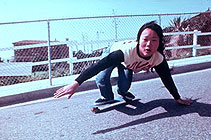|
|
|
|
Dogtown
and Z-Boys
|
 |
|
There is a sequence in Dogtown and Z-Boys that eclipses all television programs about so-called "extreme sports". On a small, fiercely guarded section of beach in the middle of a decayed and abandoned Los Angeles amusement park, hardcore surfers fly at top speeds on mighty waves towards broken railings, pylons and debris. How anyone survived this youthful ritual is beyond me. Those who did survive formed the basis of the Zephyr Skating Team – skateboarding being the activity that these teenagers (including Tony Alva, Bob Biniak and Jay Adams) turned to once the waves died down each day. Director Stacy Peralta – who was himself part of this team – leaves us in no doubt as to the streetwise credentials of this early '70s pastime. We learn how the Z-Boys (and one Z-Girl) made their own boards from stolen and customised parts; how they cruised back alleys looking for abandoned swimming pools which they would clean and then "carve" until the cops showed up; how the emotions arising from dysfunctional family backgrounds fed into the competitive rage of these riders. Dogtown and Z-Boys starts unpromisingly. Peralta bombards us with sound bites extolling skateboarding as a sophisticated twentieth century art, a form of revolution and a "hardcore urban" subculture. Viewers unacquainted with the subject (such as myself) may be instantly ready to suspect such lofty, self-aggrandising claims. But this is a highly persuasive and eventually quite absorbing documentary which backs up most of what it preaches. Peralta takes us through the entire cycle of a subculture's life – from those instants shared only by a few initiates, through to the eventful encounters with a big commercial world. Along the way, Peralta finds opportunities for pathos, nostalgia, rude humour and forward-looking wisdom. That Peralta, an insider, conducts most of the interviews is a mixed blessing. While it elicits relaxed, unguarded responses from his former comrades, it tends to generate only fawning, awestruck tributes from various young skateboarders and musicians including Henry Rollins ("we idolised you guys"). Any critical commentary on the entire Dogtown phenomenon – especially its clearly dubious sexual politics – is also minimised. This documentary is unusual in giving almost as much prominence to those who photographed and wrote about the Z-Boys in the '70s as it does to the riders themselves. There is continual homage to Craig Stecyk, whose dynamic photo layouts and pre-cyberpunk prose (he theorised that skateboarding was "urban guerrilla warfare") popularised and mythologised the activity in the '70s. Further narcissism is revealed in the final credits – Stecyk is both co-writer and production designer of the film. From another angle, however, this emphasis on the media coverage of the Z-Boys is an integral part of what the film is about. It would have been easy for Peralta to celebrate Dogtown as a purely local, ephemeral scene that was later sold out to corporate America. The film is rueful about this transformation for a few minutes – especially in relation to how the original crew dissolved, leaving father-figures Jeff Ho and Skip Engblom stranded. But then it moves on to take account of all the ways in which the street kids became young achievers – as managers, businessman and filmmakers – embracing what the wide world had to offer. Only one "burn out" case darkens this chronicle. Dogtown and Z-Boys is an intriguing piece of filmmaking. Peralta and Stecyk realise that a movie which eulogises skateboarding using terms like style, art and aesthetics must itself possess immense style. To this end, they experiment with a hundred jazzy ways of presenting still photos and archival Super 8 footage. Images shudder and dance, interview footage runs in fast-forward to the interesting bits, montage creates superb matches between surfing and skateboarding manoeuvres, and a virtually non-stop mix of songs (Jimi Hendrix and Iggy Pop are prominent) alters the mood in a split-second. The conventional documentary aspect of the project – the abundant talking-head interviews – is disrupted by some fine moments of punk anarchy. The film begins with the interview subjects criticising Peralta's "lame" questions. Mid-way, proceedings stop for a hilarious clip from television's Charlie's Angels featuring a cameo from a Z-Boy. And there is a priceless glitch left on the soundtrack: Sean Penn clearing his throat and repeating a word in the middle of his mellifluous voice-over narration. fiction version: Lords of Dogtown MORE Peralta: Riding Giants © Adrian Martin January 2002 |
![]()